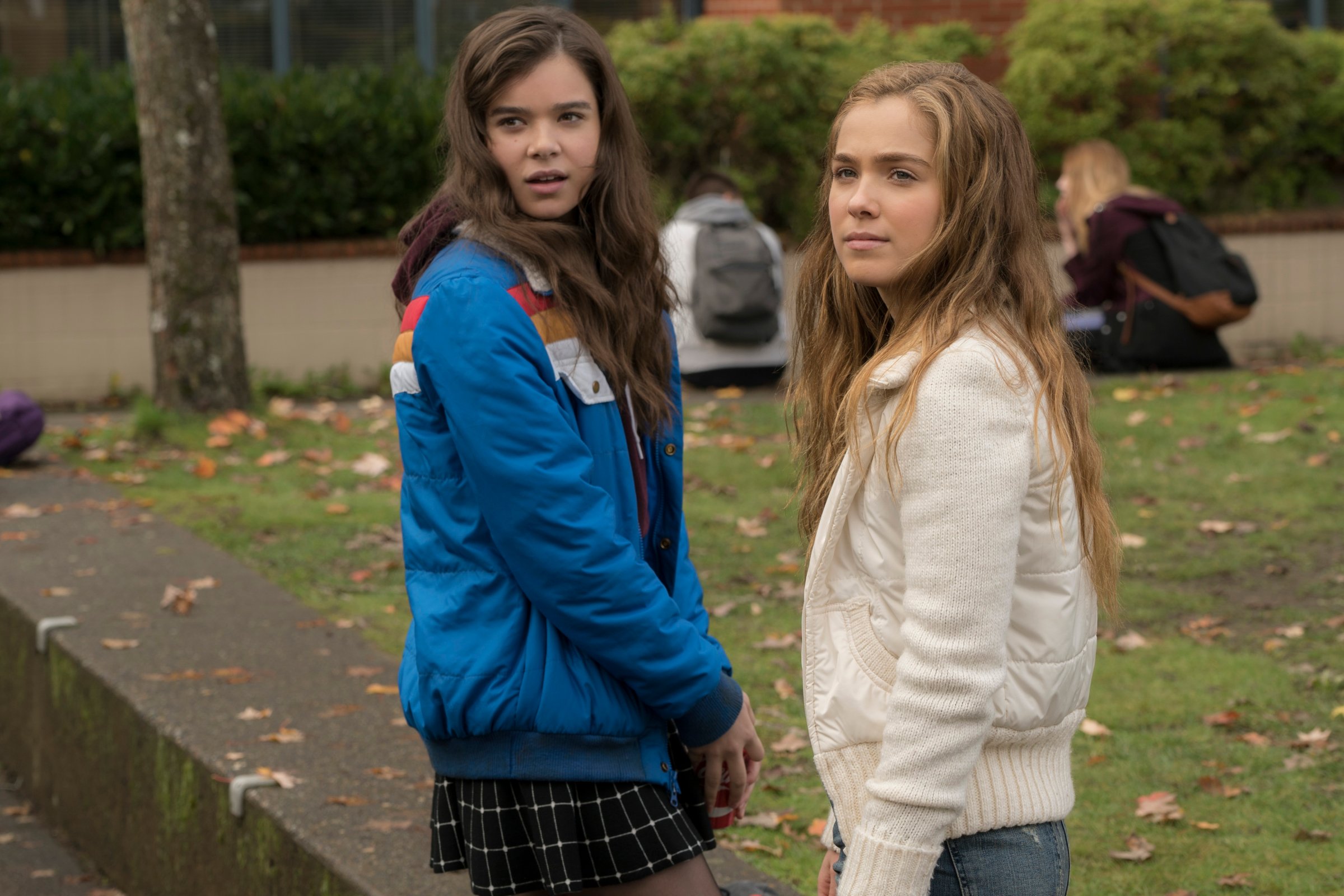
In much of popular art—if not always in life—girls and young women are told over and over how much power they have over their own lives. But that power comes with a caveat: Young people, and not just women, who think the world owes them everything can also be incredibly cruel to one another and to their family members. They need time, and experience, to get the balance right. That’s what growing up, and branching out into the world around you, is all about.
In Kelly Fremon Craig’s radiantly funny and perceptive debut, The Edge of Seventeen, nobody gets off the hook, least of all the movie’s heroine, Hailee Steinfeld’s Nadine. There’s misbehavior and misunderstanding everywhere, and often Nadine, in particular, is the one you want to shake. That doesn’t make her unsympathetic: It merely makes her believable. Nadine, crabby, impatient and judgmental, has one friend and one friend only, Krista (Haley Lu Richardson), a smart, emotionally generous young woman who’s clearly more grounded than she is. The two have been friends since childhood, after bonding while sharing joint custody of a caterpillar: The poor creature meets an ignoble end, but the friendship sticks. Nadine is perpetually angry at her harried mother (Kyra Sedgwick), and at her brother, Darian (Blake Jenner, of Richard Linklater’s Everybody Wants Some!!), a star-athlete type who’s just too perfect. But mostly, she’s angry at an absence: Her father, whom she adored, died when she was an adolescent. She has never gotten over it—to the degree that these events can ever be gotten over—and she uses her anger as both shield and weapon, a defense against the world and an ever-ready excuse to lash out at it.
Writer-director Craig doesn’t flinch from the prickliness of Nadine’s character: We see how cavalierly Nadine treats the supersmart, supersweet classmate, Hayden Szeto’s Erwin, who develops a crush on her. Only the teacher in whom she confides, Mr. Bruner (played by a wonderfully deadpan Woody Harrelson), is able to jolt her out of her self-absorption—and that’s mostly because he pretty much ignores her, at least at first. Nadine is awful—but the more terrible her behavior, the more you feel for her, thanks largely to Steinfeld’s performance: She’s a thundercloud stomping around in sneakers, and still, she’s almost incandescent with promise. Even if you can’t excuse her behavior, you can still see glimmers of the person she’s on her way to becoming.
The Edge of Seventeen is particularly perceptive in how it deals with teenage sex—maybe even with sex in general. Even though Nadine has her sights set on the brooding school hottie, she toys with Erwin’s affection, almost without even realizing it. She invites herself to his houses for a dip in his swimming pool. He can’t believe his luck—he’s going to see her in a bathing suit! He feels luckier still when, after the two have splashed around a bit, like dolphins, she suggests they have sex—only to then laugh it off, because she doesn’t really mean it.
Erwin is stung. “You don’t say that to a man,” he shoots back, and though Nadine looks slightly chastened, you can see she doesn’t quite get it—yet. In some ways The Edge of Seventeen seems like a typical coming-of-age story, but that’s only because there are so many ways in which coming of age is mundane and predictable. Craig and her actors, all of them wonderful, have freshened up the genre: As familiar as the basic story may be, it also hits some raw, nuanced notes. Nadine thinks she’s the center of the world, but she also feels she’s unworthy of it. It’s a moment of glory when she finally breaks out of both modes of thinking. Only then is she on the edge, and at the beginning, of everything.
More Must-Reads From TIME
- The 100 Most Influential People of 2024
- Coco Gauff Is Playing for Herself Now
- Scenes From Pro-Palestinian Encampments Across U.S. Universities
- 6 Compliments That Land Every Time
- If You're Dating Right Now , You're Brave: Column
- The AI That Could Heal a Divided Internet
- Fallout Is a Brilliant Model for the Future of Video Game Adaptations
- Want Weekly Recs on What to Watch, Read, and More? Sign Up for Worth Your Time
Contact us at letters@time.com